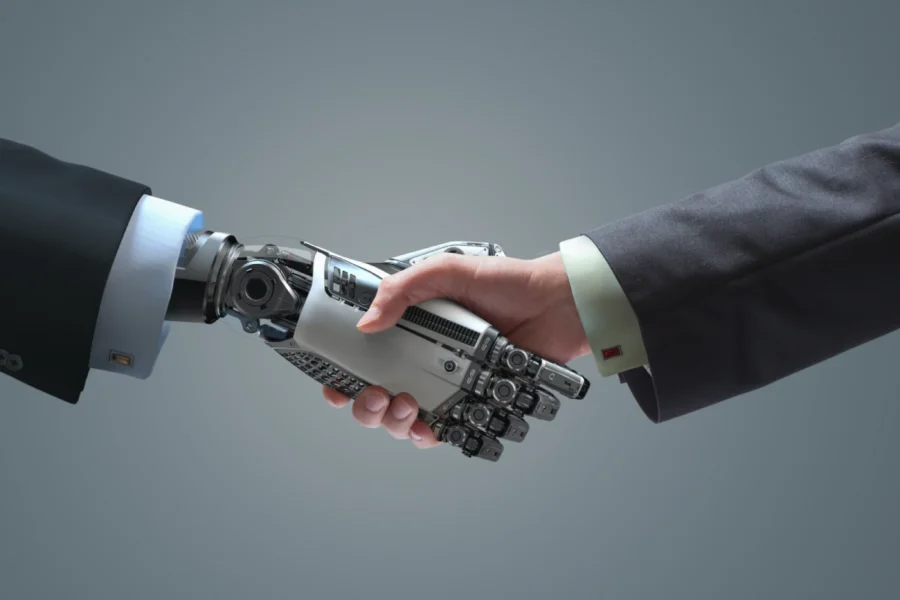Mobile applications as a strategic tool for driving business profitability
How many apps do you have on your smartphone? Obviously, there are many — a taxi service, pizza delivery, a clothing retailer app, and countless other useful tools.


Artificial intelligence (AI) is rapidly becoming a key factor for success in modern business. Its implementation is redefining the competitive landscape by automating processes, optimizing resources, and opening new opportunities for innovation. Future technologies, such as machine learning and business analytics, enable businesses not only to improve their efficiency but also to adapt to dynamic market conditions. In this context, AI is becoming an indispensable tool in the digital transformation of enterprises.
Artificial intelligence is gaining popularity as the foundation for business strategies, becoming an important tool for companies striving for innovation and efficiency. It not only changes processes within companies but also modifies the entire market, pushing businesses toward digital transformation and contributing to the formation of new business models. The implementation of AI allows businesses to:
This opens up new opportunities for improving customer service, creating personalized offers, and increasing productivity. Moreover, the development of these technologies enables more accurate forecasting and strategic planning, giving companies a competitive advantage.
Tasks such as data analysis, forecasting, decision-making, and others are enabled by mathematical and programming methods, specifically artificial intelligence (AI) algorithms.
The most common types include:
AI algorithms work with large volumes of data. Their task is to find patterns in this data and apply the knowledge gained to new tasks. The process usually involves several stages. In the first stage, the algorithm receives input data, which can be images, texts, numerical values, or other types of information. Then, the algorithm processes this data using certain rules or models to identify important patterns and relationships. Based on this analysis, it generates an output — which may be a classification, prediction, recommendation, or other conclusion, depending on the task at hand.
Process automation with the help of artificial intelligence is one of the key advantages for business optimization. AI allows the automation of the following operations:
For example, in customer service, chatbots can respond to consumer inquiries, process requests, and deliver support 24/7. In manufacturing companies, AI allows for automating quality control using machine learning, thus reducing errors and improving product quality. The implementation of automation through AI also holds great potential in finance. Algorithms can automatically process financial transactions, conduct audits, and enhance security, among other benefits.
Artificial intelligence is actively being integrated into various industries, transforming them and providing companies with a strategic edge. One of the biggest innovations in business is the shift in data processing approaches. AI is capable of analyzing vast amounts of information in real time, enabling companies to make faster and more accurate decisions.
Innovation also includes the adoption of new technologies across traditional business sectors such as finance, retail, and manufacturing. For instance, manufacturing companies apply AI to optimize supply chains, automate production processes, and improve product quality.
Another important area is the creation of new business models. The use of the Internet of Things (IoT) enables companies to receive real-time data from various devices and sensors, allowing not only to control processes but also to develop new services. For example, businesses can implement “as-a-service” models (SaaS, PaaS), which allow providing access to products and services without the need for ownership.
Overall, innovations in business through future technologies are not limited to improving existing processes. They open new opportunities to create a market where consumers receive personalized services. Thus, the implementation of AI and other innovative future technologies becomes a key success factor for companies striving to stay competitive.
AI solutions today are a key technology shaping the future of the global economy. Countries and companies are actively competing for leadership in this field. The competition is not only economic but also geopolitical, as nations with advanced AI developments can gain a strategic advantage in international politics and global markets. The leading contributors in AI development are the USA, China, the European Union, and India.
The USA, with giants like Google, Amazon, and Microsoft, maintains a dominant position in this field. These companies are heavily investing in scientific research, aiming to develop advanced machine learning algorithms and artificial general intelligence (AGI).
China, in turn, is investing actively in AI development and released a strategic plan in 2017 to achieve leadership in this field by 2030. China’s development model focuses on the large-scale use of AI across all sectors of the economy, from manufacturing to services, which allows the country to take a leading role in global competition.
The European Union aims to strike a balance between innovation and ethical standards in society. Creating regulatory norms for the use of AI is one of the EU’s main tasks to avoid undesirable consequences of inadequate technology application. In 2021, the European Commission proposed the world’s first AI regulation, focusing on principles of transparency, security, and human rights protection.
The implementation of AI in business is already yielding significant results across various industries. Here are some of the most notable examples involving well-known companies.
The company uses artificial intelligence algorithms to forecast product demand, which allows for more efficient inventory management and reduces delivery delays. Amazon’s recommendation system analyzes users’ purchase history, browsing behavior, and search queries to suggest personalized products. This helps the company increase sales and enhance the customer experience. AI is also applied to streamline warehouse operations and logistics.
Tesla actively integrates AI into its vehicles, particularly in the autopilot system. Tesla cars can analyze road conditions, detect obstacles, and adapt to changes in traffic patterns. AI not only automates driving processes but also continuously improves the system by learning from the data collected from each trip. This makes the vehicles safer and more efficient. Furthermore, AI helps optimize battery performance and charging station operations, making transportation more efficient and environmentally friendly.
Netflix is one of the most well-known examples of using artificial intelligence to create personalized recommendations. AI algorithms analyze users’ viewing history, ratings, search queries, and even watch duration to suggest content that best matches each individual user. This process helps Netflix retain viewers on its platform, reducing the likelihood that they will switch to competitors. In addition, this approach enables the company to invest in the development of new shows that are most likely to succeed.
The retailer implements AI for inventory management and forecasting fashion trends. Algorithms allow the company to track demand for various products in real time, automatically adjusting inventory levels in both offline and online stores. This helps reduce the number of unsold items and minimize storage costs. Moreover, AI analytics help forecast fashion trends based on consumer behavior analysis, social media activity, and other data. This enables H&M to quickly adapt its assortment to changing customer preferences and sustain high sales levels.
How many apps do you have on your smartphone? Obviously, there are many — a taxi service, pizza delivery, a clothing retailer app, and countless other useful tools.

Responsive design is about ensuring a smooth experience for every visitor, while supporting high traffic and business growth. According to statistics, more than 70% of Ukrainian users switch to websites via smartphones. Just imagine how many customers you can lose if you don’t provide them with a user-friendly interface.

Ukraine, 04053, Kyiv city, Kyianivskyi Lane, building 3-7 Ukraine, 79029, Lviv, Heroiv UPA Street, 73V

